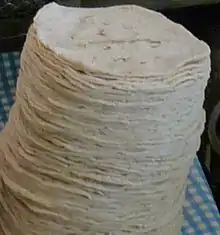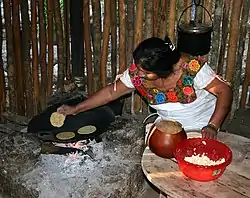Tortilla
A tortilla (/tɔːrˈtiːə/, Spanish: [toɾˈtiʎa]) is a thin, flat, circular unleavened flatbread originally made from maize hominy meal, and now also from wheat flour. The Aztecs and other Nahuatl speakers called tortillas tlaxcalli ([t͡ɬaʃˈkalli]).[1] First made by the indigenous peoples of Mesoamerica before colonization, tortillas are a fundamental part of Mesoamerican cuisine. Corn tortillas in Mesoamerica are found as early as 500 BC.
 a stack of tortillas | |
| Alternative names | Torta, tortita |
|---|---|
| Type | Flatbread |
| Place of origin | Mesoamerica |
| Main ingredients | Masa harina, Hominy |
Varieties
Corn tortilla
Tortillas made from nixtamalized maize meal—masa de maíz— are the oldest variety of tortilla. They originated in Mexico, and remain popular throughout the Americas. Peoples of the Oaxaca region in Mexico first made tortillas at the end of the Villa Stage (1500 to 500 BC).[2]Towards the end of the 19th century, the first mechanical utensils for making tortillas, called tortilla presses, tortilleras, or tortilladoras, were invented and manufactured in Mexico.
Wheat tortilla
Europeans introduced wheat and its cultivation to the American continent, and it remains the source for wheat flour tortillas. Wheat flour tortillas were originated in the northern region of Mexico.
Wheat tortillas usually contain fats such as oil or lard, salt, often leavening agents such as baking powder, and other ingredients. Otherwise, the preparation and cooking of flour tortillas on a comal is identical to that of corn tortillas. Flour tortillas are commonly used in dishes like burritos, tacos, and fajitas. It is part of the daily food repertoire in throughout Mexico, whose gastronomy and culture has influenced those of many Central American countries and some states in the U.S.
Nopaltilla
A nopaltilla is a cactus-corn tortilla. The word is a portmanteau of nopal, Spanish for the Opuntia ficus-indica cactus, and tortilla.[3][4]
See also
References
- Wood, Stephanie (ed.). "tlaxcalli". Online Nahuatl Dictionary. Wired Humanities Projects at the University of Oregon. Retrieved July 19, 2020.
- Winter, Marcus (1992). Oaxaca: the Archaeological Record (2nd ed.). Minutiae Mexicana. ISBN 968-7074-31-0. OCLC 26752490.
- Bernal, Marisa (February 20, 2012). "Cactus tortillas offer a novel take on traditional food". Arizona Daily Star. Retrieved July 19, 2020.
- Vercammen, Paul (March 17, 2009). "Can green tortillas create new jobs?". AC360°. CNN. Retrieved July 19, 2020.
